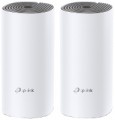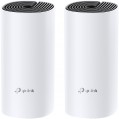Add to comparison |  |  |
|---|---|---|
| TP-LINK Deco E4 (2-pack) | TP-LINK Deco M4 (2-pack) | |
from $124.46 | from $138.07 | |
| User reviews | ||
| TOP sellers | ||
| Main | The Mesh system consists of two blocks and forms a single network that can be expanded by adding the same blocks. Up to 100 wireless devices can be connected to the system. The system is compatible with Amazon Alexa. | |
| Product type | MESH system | MESH system |
| In box | 2 devices | 2 devices |
| Data input (WAN-port) | Ethernet (RJ45) | Ethernet (RJ45) |
Wireless Wi-Fi connection | ||
| Wi-Fi standards | Wi-Fi 3 (802.11g) Wi-Fi 4 (802.11n) Wi-Fi 5 (802.11ac) | Wi-Fi 3 (802.11g) Wi-Fi 4 (802.11n) Wi-Fi 5 (802.11ac) |
| Frequency band | 2.4GHz 5 GHz | 2.4GHz 5 GHz |
| Operating ranges | dual-band (2.4 GHz and 5 GHz) | three-channel (2.4 GHz and 5 GHz in 2 channels) |
| Wireless speed 2.4 GHz | 300 Mbps | 300 Mbps |
| Wireless speed 5 GHz | 867 Mbps | 867 Mbps |
Connection and LAN | ||
| LAN | 2 ports 100 Mbps | 1 port 1 Gbps |
Antenna and transmitter | ||
| Number of antennas | 2 | 2 |
| Antenna type | internal | internal |
| MU-MIMO | ||
| Transmitter power | 23 dBm | 23 dBm |
| Signal strength 2.4 GHz | 20 dBm | 20 dBm |
| Signal strength 5 GHz | 23 dBm | 23 dBm |
Functions | ||
| Features | Amazon Alexa NAT MESH mode firewall | Amazon Alexa NAT MESH mode firewall |
| More features | DHCP server | DHCP server |
Security | ||
| Safety standards | WPA WEP WPA2 | WPA WEP WPA2 |
General | ||
| Dimensions | 91x91x191 mm | 91x91x190 mm |
| Color | ||
| Added to E-Catalog | june 2019 | april 2019 |